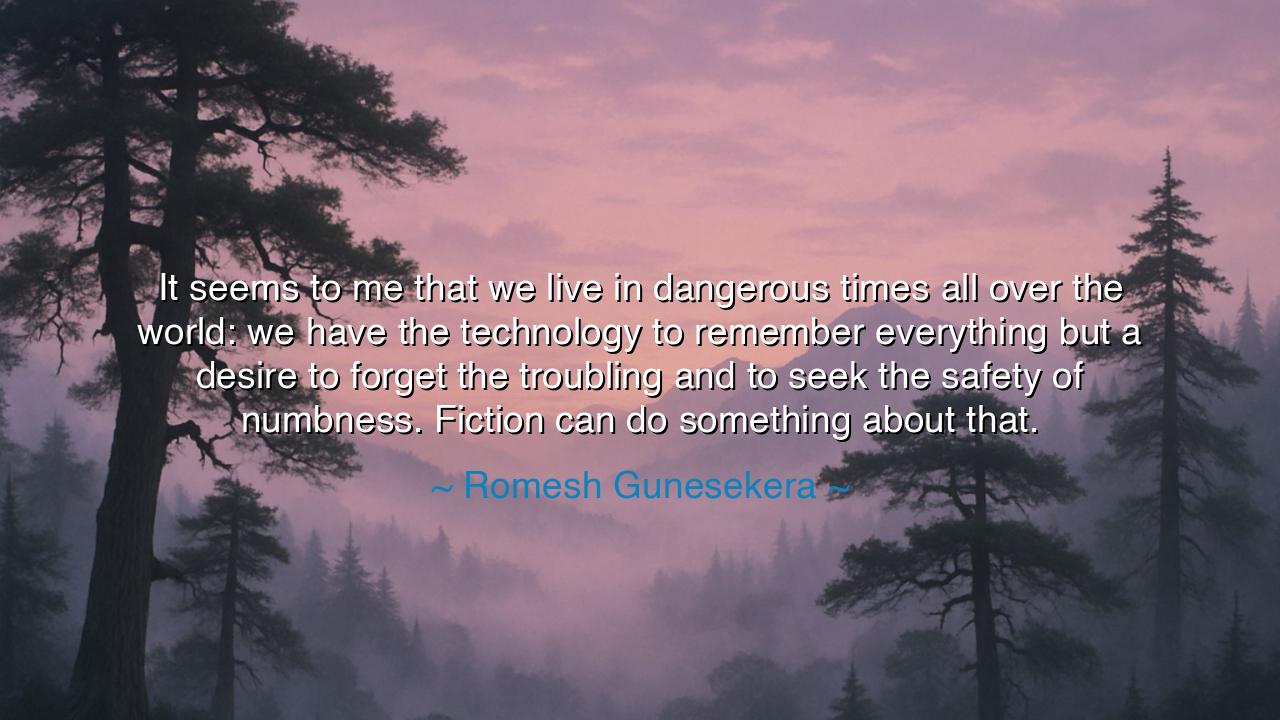
It seems to me that we live in dangerous times all over the
It seems to me that we live in dangerous times all over the world: we have the technology to remember everything but a desire to forget the troubling and to seek the safety of numbness. Fiction can do something about that.






Hear the words of Romesh Gunesekera, sharp and sorrowful: “It seems to me that we live in dangerous times all over the world: we have the technology to remember everything but a desire to forget the troubling and to seek the safety of numbness. Fiction can do something about that.” In this declaration, we hear both lament and hope—a lament for the human heart that flees from pain into forgetfulness, and a hope that story, the oldest of medicines, may awaken us to truth once more.
For truly, these are dangerous times, as he says. Never before has humankind held such power of remembrance. Every image, every word, every moment can be captured by the vast memory of machines. Technology offers the power to recall more than any sage or library of old. Yet in irony, while our devices remember, our spirits grow weary, longing instead for escape, for silence, for the dull safety of numbness. We do not wish to face the horrors of war, the cries of the oppressed, the failures of our age. We swipe them away, bury them beneath distraction, as though ignorance could shield us from consequence.
But here Gunesekera reminds us: fiction—the crafted tale, the woven story—can pierce through numbness. It can take what we wish to forget and clothe it in narrative, in characters, in voices that haunt and stir the soul. Where raw fact fails to move us, story can wound and heal, reminding us that pain is real, that suffering belongs not to “others” but to us all. Fiction, born before the first histories, has always been the way humans made meaning of chaos, carrying memory across generations.
Think of the ancient Greeks, who endured wars, plagues, and betrayals. They could have chosen numbness, could have turned from their pain. But instead, they gave us tragedy. In Aeschylus and Sophocles, they wrote of loss, betrayal, vengeance, and grief. These plays were more than entertainment—they were the conscience of the city. Through them, Athens remembered its wounds, and in remembering, grew wiser. Here we see the truth of Gunesekera’s words: fiction can do something about our dangerous desire to forget.
History gives us other witnesses. After the horrors of World War II, when nations longed to erase their guilt in comfort and forgetfulness, writers like Primo Levi and Elie Wiesel put pain into words. Their stories forced the world to remember what it wanted to bury. Without their voices, perhaps the Holocaust would have faded into numb silence. Instead, through fiction and memoir, humanity was forced to confront the truth, to vow “Never again.” Thus, story becomes not escape, but a weapon against forgetfulness, a lamp in the darkness.
The lesson is clear: memory is not always sweet, but it is sacred. Technology may preserve facts, but only story preserves meaning. To forget pain is to walk blindly into repeating it. To embrace numbness is to surrender the soul. But to face our troubles, to clothe them in words and tales, is to transmute pain into wisdom. Fiction does not erase suffering, but it gives us the strength to look at it without turning away.
Practical wisdom stands before us: Read stories that unsettle, that disturb, that challenge. Do not cling only to tales of comfort, but seek those that awaken empathy. Write your own stories of struggle and triumph, so that others may remember what you have lived. Resist the temptation of endless distraction and easy forgetting. Instead, let words, images, and narratives sharpen your heart, so that you remain awake in a world that seeks to sleep.
So let Gunesekera’s words echo in your soul: though we live in dangerous times, though technology tempts us to forget, though the spirit longs for numbness, do not surrender. Embrace fiction, embrace story, for it is the antidote to forgetting, the shield against indifference, the torch that lights the path of remembrance. For as long as humanity tells its stories, truth will not be lost, and wisdom will endure.






AAdministratorAdministrator
Welcome, honored guests. Please leave a comment, we will respond soon